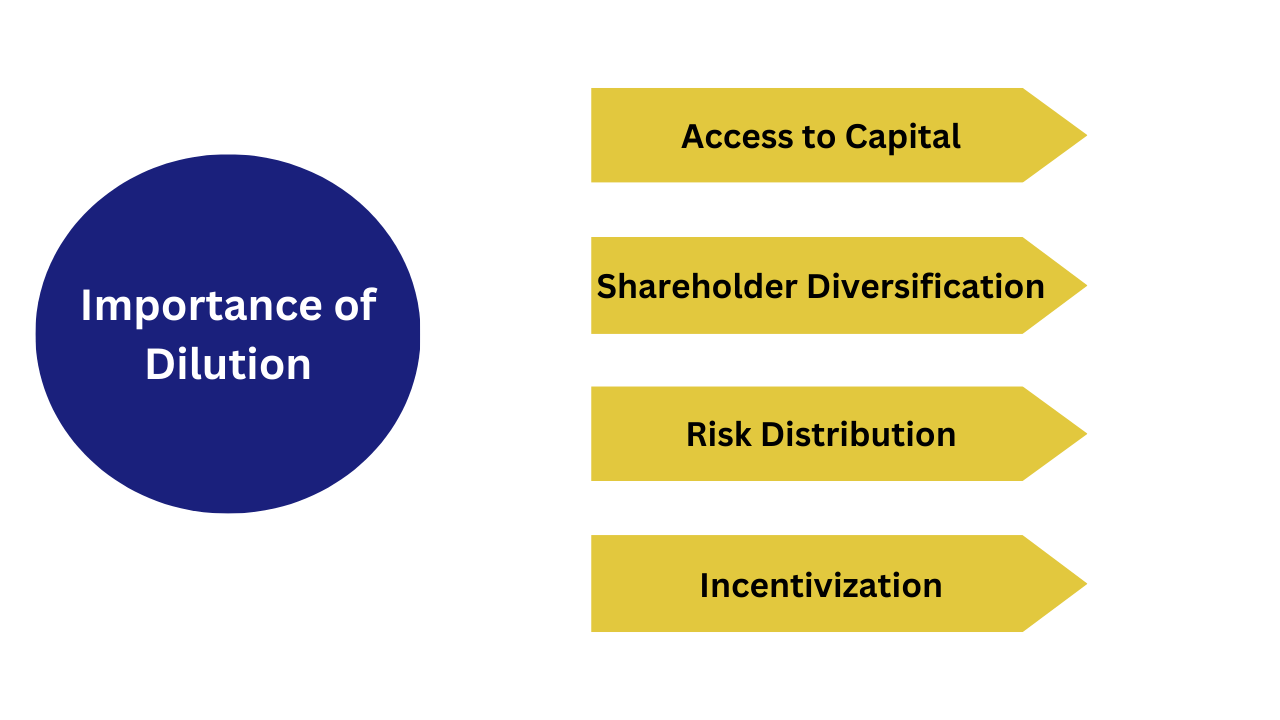Dilution: Definition, Causes, and Its Impact on Equity and Shareholders

Definition
In a business setting, dilution is often defined as a decrease in existing shareholders' ownership percentage or earnings per share as a result of a corporation issuing extra shares.
Description
Dilution meaning in business, refers to new shares issued to raise capital, fulfill obligations from convertible securities, or satisfy employee stock option plans.
For small businesses, dilution frequently reduces the power and influence of initial investors when additional shares lower existing ownership stakes. This might cause a shift in control and decision-making within the firm. While bringing in new capital is vital for expansion, if not managed properly, it risks alienating existing shareholders, hindering future investment attempts and changing the dynamics of the organisation.
Importance of Dilution in small businesses

This is why dilution is important for small businesses:
- Access to Capital: Dilution enables small businesses to issue new shares to raise capital for development, expansion, or operational upgrades, which is essential for growing operations.
- Shareholder Diversification: Bringing in new investors through dilution helps broaden the shareholder base, thereby offering fresh expertise and networks that benefit the business.
- Risk Distribution: Dilution distributes financial risk more broadly among a wider group of shareholders, which can enhance the company's financial position.
- Incentivization can be used to attract and retain talent by providing stock options, which link employee interests with the company's success.
How to calculate startup dilution?
Calculating startup dilution entails many critical elements that determine how the issuance of new shares affects the ownership proportion of existing shareholders.
Here's a step-by-step instructions:
- Determine the Current Ownership: Begin by determining the total number of existing shares. This will be your starting point for learning how current shares are allocated among existing shareholders.
- Calculate the New Shares to be Issued: Determine how many new shares you need to issue. This could be for capital raising, meeting obligations arising from convertible securities, employee stock options, or other reasons.
- Add New Shares to Existing Shares: Add the number of new shares to be issued to the total number of current shares. This calculates the new total number of shares following the dilution.
- Calculate New Ownership Percentages: Divide the number of shares that each shareholder (including new ones, if appropriate) will possess by the total number of shares. To calculate the percentage, multiply the value by 100. This will give you the new ownership percentage for each shareholder.
- Assess the Impact of Dilution: Compare the new ownership percentages to the original percentages to determine how much each shareholder's interest has been diluted. Calculate each shareholder's percentage loss in ownership to determine the dilution effect.
Emerging trends for dilution

Two emerging trends that can impact startup dilution are:
Alternative Financing Models:
Startups increasingly seek alternative financing strategies other than traditional venture capital (VC) funding to reduce dilution. These options include revenue-based financing, which allows firms to repay investors a percentage of their revenue rather than giving up ownership.
Another trend is the emergence of crowdfunding platforms, which enable entrepreneurs to raise funds from many individual investors in exchange for rewards, debt, or stock. By diversifying their fundraising techniques, businesses can lessen their reliance on equity financing, reducing dilution for existing shareholders.
Secondary Markets for Private Shares:
Introducing secondary markets for private shares allows businesses and their early investors to partially pay out without requiring a traditional IPO or acquisition. These secondary markets, made possible by platforms like EquityZen and SharesPost, enable early employees, founders, and investors to sell their stock to accredited investors.
Secondary markets allow stakeholders to earn value from their stock holdings while potentially delaying or minimizing dilution from future investment rounds. This trend gives entrepreneurs more choice in managing dilution and optimizing their capital structure.
Example
Assume you're the founder of a technology startup and initially possess 100% of the company's stock. You seek venture capitalists' (VCs) investment to raise funds for future expansion. The VCs agree to invest $1 million for a 20% interest in your company. As a result, they receive freshly issued shares equal to 20% of the total shares outstanding.
Before the investment:
- Founder: 100% ownership
- Total Shares: 100
After the investment:
- Founder: 80% ownership (100% - 20%)
- VCs: 20% ownership
- Total Shares: 125 (100 existing shares + 25 new shares issued for the investment)
In this scenario, your firm has successfully raised funding, marking an important milestone in its development. While your ownership percentage has reduced from 100% to 80% due to the issue of additional shares to the VCs, this loss in ownership is an important step forward. Additional dilution may occur when the company goes through successive funding rounds or issues employee stock options, but this reflects the company's growth and potential.
FAQ
What is share dilution, and how does it impact existing shareholders?
Share dilution occurs when a corporation issues extra shares, resulting in a fall in the ownership proportion of existing shareholders.
- When a corporation issues additional shares, such as through a secondary offering or employee stock options, the current shareholders' ownership interest is correspondingly reduced.
- This may result in a decline in earnings per share (EPS) and voting power per share for existing owners. Share dilution can affect shareholder value and is an essential factor for investors to consider when assessing the impact of a company's new share issuances.
What is stock dilution, and what are its causes and effects?
Stock dilution occurs when a company's outstanding shares rise, lowering the ownership proportion and value of existing shares.
- Stock dilution can occur due to a variety of circumstances, including the issue of new shares through secondary offerings, stock-based remuneration for employees, convertible securities such as stock options and convertible bonds, and anti-dilution measures triggered by specific events.
- Stock dilution can result in lower earnings per share (EPS), less voting power per share, and perhaps lower stock prices as the market adjusts to the increasing supply of shares.
- Understanding stock dilution is critical for investors to evaluate its influence on shareholder value and make sound investment decisions.
Why choose Us?
Filing Buddy is an entity which is focused at providing legal, financial, and corporate and compliances consultancy services to business entities. Our organisation is a structure made of enthusiastics.

EXPERTISE & RELIABILITY
Trusted industry professionals ensuring compliance, accurate tax filing, and comprehensive services for your business needs.

TAILORED SOLUTIONS
Customized services to meet your specific requirements, including business incorporation, trademarks, patents, and seamless GST return filing.

TIMELY SUPPORT
Dedicated support team committed to providing prompt assistance, resolving queries, and ensuring smooth operations for your business.

COMPETITIVE ADVANTAGE
Gain a competitive edge with our comprehensive suite of services, enabling you to focus on growth while we handle your compliance and taxation needs.















.webp)
.webp)

.webp)

